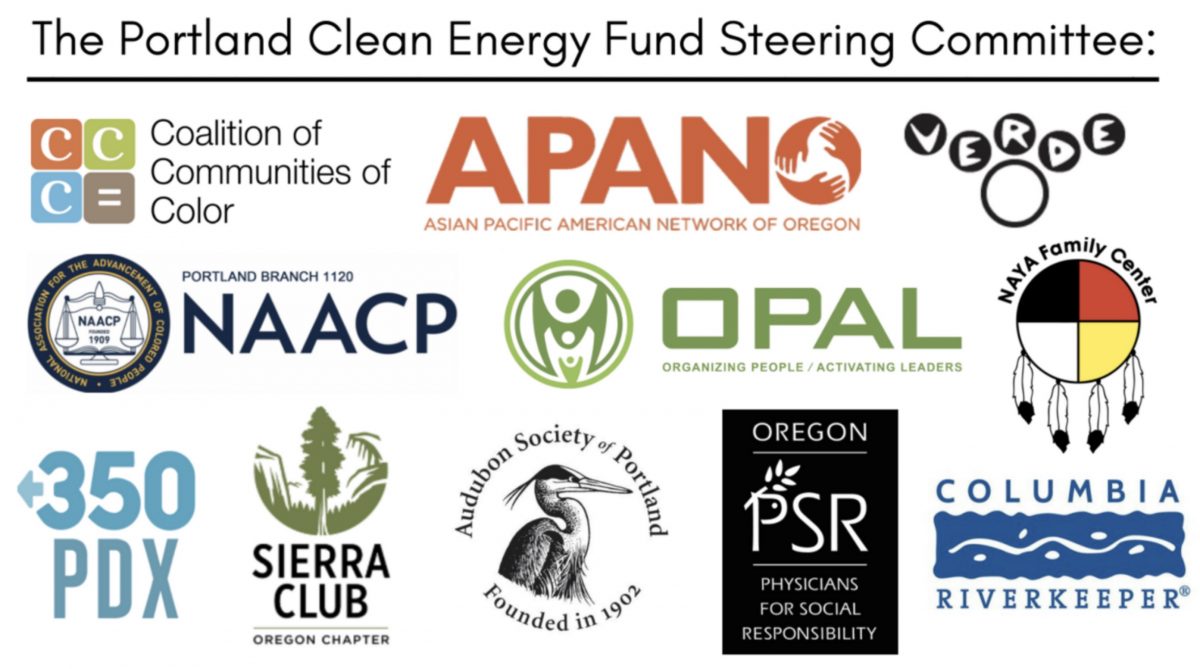
This week Portland City Council voted to fund a list of 45 projects worth $8.6 million as part of the Portland Clean Energy Fund (PCEF). It’s just the first tranche of what’s expected to be a much larger annual haul in years to come. The money is raised by a 1% fee on the business income of large national retail corporations.
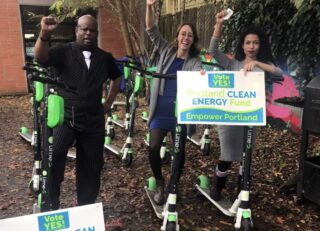
“Portland is leading the way on what a Green New Deal looks like,” said Commissioner Jo Ann Hardesty, in a statement yesterday.
Far more than just another government effort to tackle climate change, the success of PCEF matters because it represents how Portland advocacy and politics is responding to our collective reckoning around racial and social justice. It’s also notable that despite the transportation sector being the largest contributor to greenhouse gas emissions in Multnomah County, transportation projects were largely absent from the list of grantees.
Of the 45 projects, only two grants went to transportation-focused nonprofits. The Getting There Together Coalition (which came together to create the Metro funding measure that was opposed by voters in 2020) won $90,460 to, “determine the best community engagement practices with their priority populations and to confirm their needs related to transportation policies,” and electric vehicle nonprofit Forth won $84,300 to study how diesel school buses impact students and to explore bus electrification potential.
Advertisement
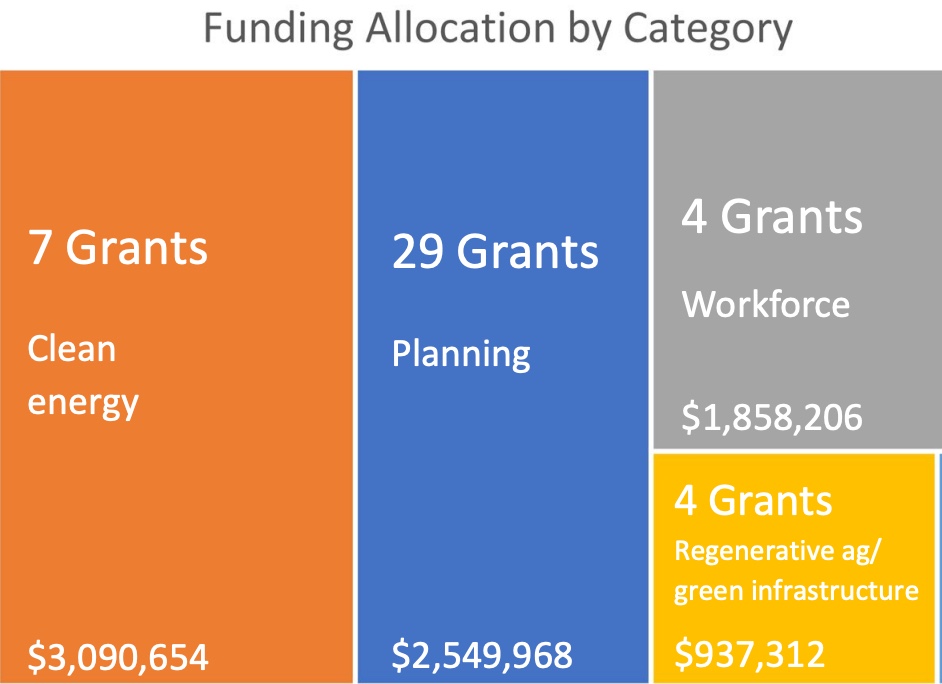

(Photo: Portland Bureau of Planning & Sustainability)
The PCEF was created via a ballot measure that passed in 2018 with over 64% approval. From its genesis in 2016, it was created to bring new community groups to the environmental advocacy table — specifically groups led by people of color and others who have been historically underrepresented. “As the nation’s first-ever climate-fund created and led by communities of color, PCEF is for and by the community. PCEF centers Black and Indigenous people, and other disadvantaged and marginalized groups in addressing the climate crisis,” reads the program’s website.
One of the community organizers who spearheaded the effort was Khanh Pham, who now represents Portland’s 46th District in the Oregon House of Representatives. According to Pham, she and other leaders spent two-and-a-half years building their coalition before they launched the campaign. In a video (below) about the successful passage of the measure in 2018, Rep. Pham said the coalition represents a “new progressive majority in town.”
“Oregon has a long history of white supremacy and you can see it even in our environmental movement,” Pham continued. “Middle and upper-class homeowners tend to dominant the movement and benefit the most from our clean energy programs. This initiative shows that communities of color are passionate about, committed to, and dedicated to a just energy transition.”
It also shows that despite its vast GHG-reduction potential, transportation infrastructure and planning projects have not found their way onto the radar of this new, more diverse coalition that has gained considerable influence in recent years. For that to change, Portland’s bicycle and active transportation advocacy scene — which has historically been dominated by white, middle and upper-income activists — must evolve and build new relationships.
PCEF is an exciting success story. If the goal is to fight climate change it must embrace how we move around — and transportation reform activists must seek out its leaders and grab a seat at the table. That includes BikePortland! It’s embarrassing how little attention this site has given to this effort thus far. Stay tuned for more coverage!
Learn more about the PCEF at the coalition website and watch the video below:
— Jonathan Maus: (503) 706-8804, @jonathan_maus on Twitter and jonathan@bikeportland.org
— Get our headlines delivered to your inbox.
— Support this independent community media outlet with a one-time contribution or monthly subscription.



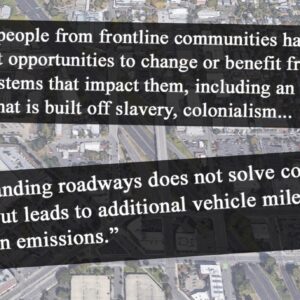
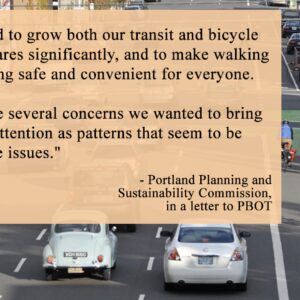


Thanks for reading.
BikePortland has served this community with independent community journalism since 2005. We rely on subscriptions from readers like you to survive. Your financial support is vital in keeping this valuable resource alive and well.
Please subscribe today to strengthen and expand our work.
A few comments:
1) While true that the transportation sector is an enormous contributor to climate change, transportation was never a main focal point of the PCEF ballot measure, which may be read in full at https://www.portlandoregon.gov/auditor/article/674246. I feel compelled to comment that this measure should not be expected to be a silver-bullet solution to Portland’s climate and environmental injustices. The first round of funding is lining up very well with the voter-approved goals and priorities of Measure 26-201, which received 65% in favor in 2018 (not 64% – source: https://results.oregonvotes.gov/ResultsSW.aspx?type=CTYALL&cty=26&map=CTY&eid=12)
2) There’s considerable overlap between the membership of the Portland Clean Energy Fund coalition steering committee and the Getting There Together coalition (OPAL Environmental Justice Oregon, APANO, Verde) and these BIPOC-led organizations include and are in partnership with active transportation advocates. Rather than beginning with the assumption that a seat at the table needs grabbing, perhaps a better route is to listen deeply and ask “how can I/we help?” That’s the approach I strive to take.
Looking forward to more coverage of this issue that doesn’t pre-suppose what the priorities of PCEF should be.
Still, if your goal is to fight climate change, you had better address the factors that are most responsible for climate change – transportation being #1.
Now I’m going to work on my beer belly by watching TV and eating Cheetos.
A shocking abdication of trust by the woke-erati; sell taxpayers on something and then use the money however you please. It’s just cultural elitism from another angle.
Reminds me of everyone’s favorite tax to hate on; the Arts Tax. And that silly thing has been paying dividends for tax-skeptics for years due to it’s ham-fisted implementation and collection.
Even as a self proclaimed government is good progressive this feels like irresponsible overreach. If we want people to believe government is a force for good we have to fight everyday to prove it worthy of that trust. Breaking promises is not good government.
This is great news and really impressive how they have been so successful engaging such a diverse group to build a broad coalition.
When folks were passing the petitions to get it on the ballot, and when it was being campaigned, transportation was not a focal point. The messaging I heard was that the $ would go toward training BIPOC contractors who would then go into the community to improve residential sructures in disadvantaged communities in the area of energy efficiency/solarization/weatherization/modernizing HVAC, etc. Minority-owned businesses were also going to be eligible for grants to improve their energy footprint.
Not surprising no transportation funding. Regardless, the Clean
Energy Fund is essentially a large “slush fund” with no accountability or performance metrics. One more tax drag on our local economy, raising prices for middle and lower income folks who shop at the big box stores (Walmart, Fred Meyers, etc)
It is true that the PCEF was not focused on transportation. It also wasn’t qbilled in the ballot measure as funding the study of healing gardens while passing over a proposal on energy retrofits. In the first round a garden study got more money than the transportation coalition referenced above.
Maybe the biggest challenge for the PCEF is that the energy efficiency space is well trod ground in Portland. Since the 80s we’ve been spending big on energy efficiency. And yes, that has benefited homeowners disproportionately.
For people in the energy space there has been skepticism that there are enough valid projects for this program to work. Without including transportation it is possible this program will devolve into a joke.
APANO’s grant that funds EV charging facilities, solar installs, and seeks to train community members in green trades was also funded.
https://www.bizjournals.com/portland/news/feature/dont-count-portland-out/2021
I can be somewhat critical in the BP comments section but my only reservation about PCEF is that its projected revenue should 10x larger (at least).
Every single project coming out of the bucket of funding needs to quantifiably reduce emissions. Do we really need to study the need for diesel filters on school buses? I mean for $90,000 we could get 4 actual bus filters. Bring Forth a team of carbon auditors instead of PR media spin doctors.
The Getting There Together Coalition specifically withheld their financial documentation till very late in the Metro 2020 package and to this day aren’t a registered State of Oregon Business. This allocation is at complete odds with the requirement that the nonprofit have a proven track record. Getting There Together has a failed track record, just like Renew Oregon. Now the insider crew is giving them a consolation prize at the expense of transportation projects we know work. A plan from them on how they are going to listen makes me want to hurl in the back of my throat just a little. Looks like we got PUNXked!
This program funding is not required to result in carbon reduction. Therefore the entire project is justifiably subject to integrity criticism, and now a hammering by tax activist. I have to disagree with Soren below. I don’t think it needs 10X more money. We need to ensure we are getting reduction results.
It’s not enough just to have Brown people at the table dolling out the money. We need actual change makers, not green washers.
Just in case anybody was wondering the Community Cycle Center Application that was denied, even though it combined both Planning and Real Infrastructure Placement.
Application #2446
Applicant: Community Cycling Center
Project type: Planning
Amount of request: $100,000
Length of grant: 1 year
Project includes physical improvement: Yes
Score: 72.60 of 100
Recommended by PCEF Grant Committee: No
Project summary
The planning project seeks to build relationships, establish trust, listen to community needs, and design bicycle and transportation interventions, including the construction of a green-built, solar-powered free bicycle repair Hub in East Portland. Over a 12 month time frame, the proposed planning process will include: 1) community outreach and research; 2) collaboration and partnership building; 3) a feasibility study and location for the new Hub; 4) hiring contractors and consultants to assist plans and designs to equip the new Hub with solar power; and 5) building culturally-specific programming for new community.
I appreciate your comment and insight. I am struggling to understand why the Community Cycling Center was not funded. Maus points out that there needs to be more outreach from the cycling community to communities of color. It seems that the CCC grant was intended to do so.
It’s also an interesting test for the Street Trust’s new leader. If Iannarone is really the coalition builder that her supporters have claimed her to be, she should be all over this. This is a really good opportunity for her to be the leader she claims to be.
As for the taxpayer perspective, the program is sitting on a pile of cash. This program will become 10x larger over time. At least.
If I was on the program committee giving out these unaccountable sacks of cash I would loose lots of sleep at night remembering the City Auditor exists. These are taxpayer dollars and performance audits will occur. Perhaps the oversight committee should’ve made sure to study up on the history of the BETC fiasco. This looks to be much much worse.
Improving the ability of marginalized communities to participate in the bougie “green” economy was always a major focus of PCEF so I have modest expectations when it comes to active transportation. It’s the Portland Clean *Energy* Fund, after all.
That being said, I think some of the complaints about this small initial round of funding stem from the fact that “planning” projects were emphasized and that transportation funding focused on EVs and electrification (as opposed to bikes).
I think I agree with soren on this. If we want to do transportation differently — and make it less white, exclusive, racist, and so on — we can’t just start funding projects with the current set of people around the table. We need different people around the table who feel included and empowered. I feel like this first tranche of funding is more about doing that organizing/capacity-building work will be crucial to have in place for future decisions. This is what the change we all marched for this summer looks like folks! Let’s bring new voices to the forefront — and pay them for it! — and then work together to keep the ball rolling onto bigger and better things.
This my optimistic outlook. I reserve the right to remain skeptical and vigilant about PCEF and every other big government program because I think that’s reasonable not just as a journalist but as a member of our community.
Agreed. The ‘planning’ projects seem to have eclipsed the actual program grants. NAYA for instance has a really strong history of running energy assistance and other programs and understands the space. They seem to have strong management and financial oversight. Solid recipient.
I guess I see active transportation as the equivalent of an energy efficiency program. Insulation isn’t a furnace, but it relates to less use of the furnace. So to with walking and biking.
That garden research proposal sort of points to the committee not being laser focused on energy and moving much further from the core mission than funding the CCC would be.
None of the YogaPunx instructors are grounded in Native American practices. They are all practicing traditionally yoga practices. None of their instructor biographies include a POC. I do not at all trust their medicine planting offerings. Not. One. Bit. Sacred native american plants should be administered by actual Native Americans. Super Wow Sam Baraso, did you guys vet this?
I have a bad feeling about the bulk of money going to fund studies and planning.
I think organizations should generally have enough inhouse talent, experience and committment to figure out what they plan to do, and why, and how. If not, does the organization have the horsepower to actually carry out those plans? Or will even more public grants then be needed to staff up the organization, hire headcount and leadership, build out the administration – followed by more grants to study and plan – before a gram of carbon is touched? That way lies a consultants’ full employment act.